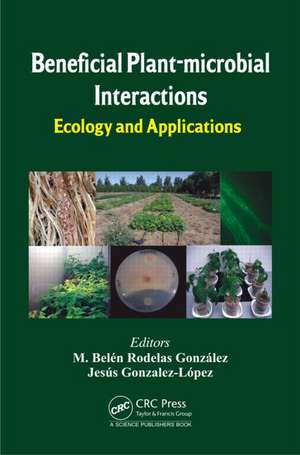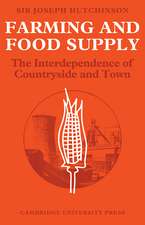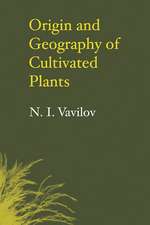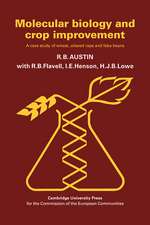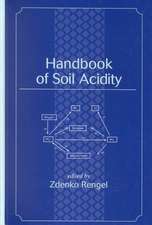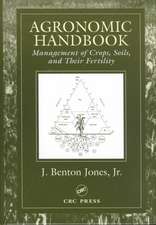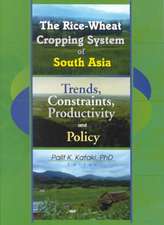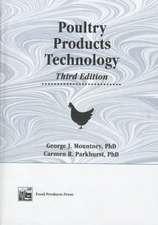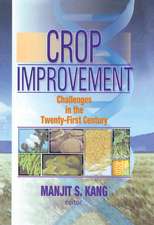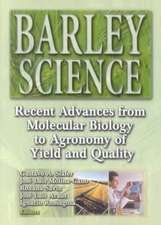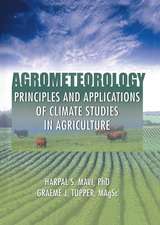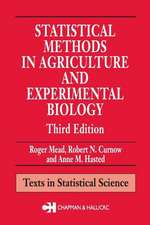Beneficial Plant-microbial Interactions: Ecology and Applications
Editat de M. Belén Rodelas González, Jesús Gonzalez-Lópezen Limba Engleză Hardback – 10 iul 2013
Preț: 1339.62 lei
Preț vechi: 1633.68 lei
-18% Nou
Puncte Express: 2009
Preț estimativ în valută:
256.37€ • 278.38$ • 215.35£
256.37€ • 278.38$ • 215.35£
Carte tipărită la comandă
Livrare economică 22 aprilie-06 mai
Preluare comenzi: 021 569.72.76
Specificații
ISBN-13: 9781466587175
ISBN-10: 1466587172
Pagini: 468
Ilustrații: 22 b/w images and 4 color images
Dimensiuni: 156 x 234 x 36 mm
Greutate: 0.82 kg
Ediția:1
Editura: CRC Press
Colecția CRC Press
Locul publicării:Boca Raton, United States
ISBN-10: 1466587172
Pagini: 468
Ilustrații: 22 b/w images and 4 color images
Dimensiuni: 156 x 234 x 36 mm
Greutate: 0.82 kg
Ediția:1
Editura: CRC Press
Colecția CRC Press
Locul publicării:Boca Raton, United States
Cuprins
Preface 1. Nitrogen Fixing Endosymbiotic Bacteria: Old Chaps and New Findings 2. Biodiversity of Slow-Growing Rhizobia: The Genus Bradyrhizobium 3. Importance of Motile and Biofilm Lifestyles of Rhizobia for the Establishment of Symbiosis with Legumes 4. Nod Factor Production and Abiotic Stress in Rhizobium 5. Strategies of Salt Tolerance in the Rhizobia-Legume Symbiosis 6. Mineral Nutrition in the Legume-Rhizobia Nitrogen Fixing Symbiosis 7. Metal Transport in the Rhizobium-Legume Symbiosis 8. Ecology of Denitrification in Soils and Plant-Associated Bacteria 9. Bacterial Protein Secretion Systems: Implications in Beneficial Associations with Plants 10. Nodular Endophytes: An Untapped Diversity 11. Azospirillum-Plant Interaction: from Root Colonization to Plant Growth Promotion 12. Biocontrol of Fungal Root Pathogens by Fluorescent Pseudomonas 13. Inoculants based in Autochthonous Microorganisms, a Strategy to Optimize Agronomic Performance of Biofertilizers 14. Engineering the Rhizosphere of Legumes for Improved Bioremediation 15. Arbuscular Mycorrhizas and their Significance in Promoting Soil-Plant System Sustainability against Environmental Stresses 16. Can Arbuscular Mycorrhizal Fungi (AMF) be Effective Tools for Improving the Nutritional Quality of Crops? Findings from a Worldwide Consumed Vegetable: Lettuce; 17. Ectomycorrhizal Plants: Methods, Applications and Certification 18. Metagenomics of Plant-Microorganism Interaction: Source of Novel Recombinant Genes for Biotechnological Applications
Notă biografică
M. Belén Rodelas González Department of Microbiology Faculty of Pharmacy; Jesús González-López Department of Microbiology Faculty of Pharmacy, both University of Granada, Spain.
Descriere
This book provides insight into the mechanisms underlying the interactions of plants and microbes, the ecological relevance and roles of these symbioses, the adaptive mechanisms of plant-associated microorganisms to abiotic stress and their contribution to plant stress tolerance, and the potential of these interactions as tools in agrobiotechnology. A team of authors with wide experience in the area contribute up-to-date reviews in nineteen chapters devoted to different ecological and applied aspects of the rhizobia-legume symbiosis, ecto- and endomycorrhizas, and plant associations with diazotrophic or adiazotrophic plant-growth promoting rhizobacteria.
